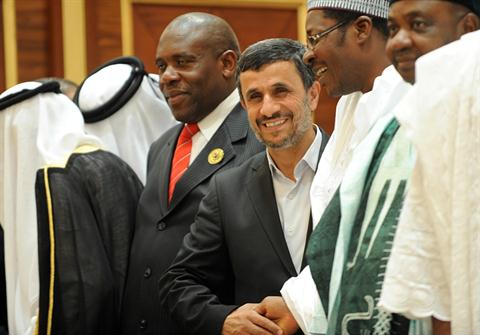Hillary Clinton is in trouble. Nothing seems to work for her campaign. Obama’s positions are not much different than hers but he has a clear edge.
What he has going for him is a movement rather than simply a successful campaign strategy. Obama as movement transcends Obama himself. If deep disappointments are to be avoided, the movement must remain an active force, should Obama win the White House.
Since John Edwards left the race, the fight for the Democratic nomination has been less about the policies the new president will enact once in office and more about how he will enact them.
Obama’s positions on issues of concern to voters are very close to Hillary Clinton’s. Moreover, when the two candidates differ, Clinton’s positions are often more progressive, as with health care and the sub prime mortgages. In foreign policy both a Clinton and an Obama White House will retain the commitment to a sole superpower status. Yes, the American empire would have a less militarized foreign policy, but neither candidate has learned much about the limitations of force.
Obama has indicated a willingness to use force against Pakistan and Hillary does not rule it out on Iran. And in both White Houses, American troop level will be increased. Even missile defense has a place in Obama’s national security vision and he has promised to fully assist Israel with such programs.
It is worth noting that his key foreign policy advisers are well known faces in previous democratic administrations who offer little substantive hope for real change.
None of this, however, seems to matter for the Obama supporters. Even more, Hillary’s repeated reference to Obama’s inexperience seems to backfire. In fact, it is perhaps precisely this inexperience that appeals to the Obama movement.
The energy and momentum of the Obama candidacy is inexplicable if isolated from the traumas of US politics in the last two decades. The Obama movement is clearly a repudiation of Washington and a clear message of mistrust of politics and politicians.
Democrats, including many progressives, had high hopes when Bill Clinton took office in 1993. The Clinton presidency came amidst the conservative ascendancy. Clinton’s “New Democrat slogan and his right of center positions in the 1992 campaign were crucial for his victory. While he promised in the campaign to “end gridlock in Washington, Clinton’s two terms were instead a textbook of fierce partisan battles with the Gingrich Republicans. The gridlock reached a new record with the federal government’s shutdowns and later the national ordeal of impeachment.
Clinton left office highly popular but his party was in shambles.
The Bush years have been far worse, in terms of how Washington is run. The candidate who ran as a “uniter not a divider ended up being the President of half of America. The Rove strategy for the Bush presidency was to pass the President’s agenda in Congress with the slimmest majority.
The famously dubbed “50%+1 strategy means that the White House responds just to the base of the GOP and ignores everyone else, including moderate Republicans. “With us or against us was not simply about the so-called war on terrorism. The Rove governing strategy amounted to unilateralism in Washington as well as in the world. Under House Majority leader Tom DeLay, Republicans who deviated were arms twisted or punished just as America’s allies and friends abroad. Democratic members and constituents were simply ignored.
Revulsion at those fierce and unproductive partisan battles during the Clinton and the Bush years is precisely what drives the Obama movement. What has become of America, the young supporters of Obama ask. Obama’s healing message about bipartisanship and uniting the country matters more to his supporters than his positions on issues.
Hillary Clinton in this context is part of the “problem not the solution. She had been in charge of the Clinton Health Care proposal. The story of the rise and collapse of that proposal in 1993-4 symbolizes all that is wrong with Washington in the eyes of the Obama supporters, from the secrecy with which the proposal was handled to the special interests battles and partisan wars it stimulated. Hillary was immensely involved in those bitter fights which were the beginning of the end of the democratic majority in Congress. Today she remains one of the most polarizing figures in American politics.
Those who energize the Obama campaign are sick of Washington and long for a new beginning. Obama is a fresh face. He has experience in community work in Illinois rather than in the Washington beltway battles. In his forties, he holds out the promise of moving beyond the same old fights of the baby boomers who sometimes seem to be still living the battles of 1960s.
But the movement dimension of the Obama phenomenon is not all good news. There is a potential long-term problem, now screened by all that positive, youthful enthusiasm. To be blunt, movement Obama is far more progressive than candidate Obama. Obama’s connections with Wall Street and special interests, after all, are no less powerful than Hillary’s and his policy positions reflect these realities.
As an Egyptian I can understand the emotions behind the Obama movement. The US is in terrible shape and many Americans are willing to take a risk and hope change will get them out of the mess they are in.
Clearly, the promise of the Obama campaign is fueled by the movement. If sustained, this new energy might just transform America. From the labor and women movements to the civil rights struggle, US history tells us that movements have been the source of the transformational power behind the most progressive changes in America.
But as a specialist on US politics I can hardly be excited with the candidate himself or with the idea of the first African-American president when I look at the positions Obama takes on issues. It is intriguing to see the overwhelming support he gets from African-Americans and progressives without seriously engaging important issues and simply ignoring crucial others.
Why should the skin color of the new president matter if he does not speak out about the inequalities that are symbolized by New Orleans debacle, Jena and the sub prime mortgages that especially targeted minorities? Should the dark-skinned Pakistanis feel better simply because the candidate who threatened to bomb their country is himself black? And why should Americans trust Obama to do better once in office? Isn’t this ‘trust me’ attitude precisely the Bushspeak that got America into disasters like wiretapping, Guantanamo and the invasion of Iraq?
Any democratic president will face a conservative movement that is alive and well, fully committed to doing everything it can to defeat the Democrat’s agenda. Obama, who carefully positions himself on issues to avoid losing any votes, will very likely avoid addressing the issues that can cost him a second term as president. That’s why Obama, if he is to be the agent of change so many hope for, needs the movement far more than it needs him.
Only the movement can push him into becoming a truly transformational leader. For that to happen, the movement, as distinct from the candidate, must remain a force even if Obama should win and it must continue to exert pressure for progressive changes.
Otherwise, Obama, will be yet another Democrat who keeps diluting and changing his positions to survive in conservative America. Yes, for Americans as well as the world it is important to unite America. But the aims and purposes of a united America are no less important.
Dr. Manar Shorbagy is associate professor of political science. She is specialized in US politics and teaches at the American University in Cairo.



